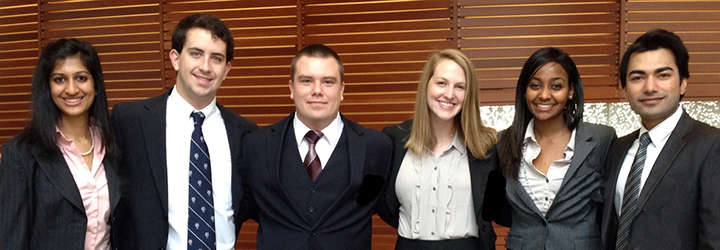
Two Naveen Jindal School of Management full-time MBA students recently joined three students from UT Southwestern Medical School and an engineering student from UT Arlington on a winning team that placed first and earned $6,000 in the International Emory Global Health Case Competition.
The multidisciplinary UT group successfully responded to the competition challenge to reorganize the World Health Organization, a United Nations agency founded in 1948, to redefine its purpose and role in addressing global health issues in the 21st century. The team also won the Participants’ Choice Award, voted on by all competitors, for making the best presentation at the event.
Sponsored by Emory University’s Global Health Institute, the annual competition focuses on worldwide health-related cases that require an interdisciplinary solution. This year, nearly 140 students from 24 universities across the United States and from Australia, Canada and Sweden competed. A team from Johns Hopkins University placed second, and a team from the University of Alberta placed third.
“This was such an unusual case competition in that it included UT students from three different schools, three different areas of study,” Lisa Shatz, JSOM assistant dean for MBA programs, said about the team fielded under UT Southwestern Medical Center’s name. “It was a great opportunity for business students to represent how the problem-solving skills taught in business school can be applied to any issue — in this case the World Health Organization.”
Details and a dramatic face-to-face appeal made the winning difference for the UT team at the March 29 finals, according to JSOM participants Sarah (Jane) Slusher and Rohit Tyagi.
The judges said “that we were the only team that whatever they asked, we had the answer,” Tyagi said.
And, responding to a finals-round twist — political criticism decrying WHO as too focused on Western ideals and too Westernized — Slusher made a direct appeal to the detractor. She addressed the man, role-playing the president of Russia, as well WHO’s board of directors in the team’s presentation close. Recalling past successful joint U.S.-Russian efforts to fight the polio pandemic, she said to the “pretend Putin” as she walked over to him, “If you don’t belong to organizations like this, you’re going to discount your population from global health.
“And then I said, ‘So, Russia, take a leap with us.’ And then I addressed everyone and said, ‘Take a leap with us.’ It was moving.”
Leap was an important word for the team because it called its reformation plan LEAP, short for Leaders Enabling Efficient Approaches Through Partners and Priorities.
The team arrived at the plan after identifying three major problems, Tyagi said. One was an image issue, leading to increasing numbers of earmarked donations that tied up WHO’s funding and cost it autonomy. Another was lack of coordinated effort exacerbated by the freewheeling autonomy of some internal WHO groups. And the third was the challenge of faith-based, non-governmental and private organizations drawing away WHO donations by targeting specific health problems.
The team addressed the image problem by rethinking WHO’s mission, recommending the organization change from running a “boots on the ground” operation that did everything to becoming a global facilitator. As Slusher put it: “We felt their real core competency wasn’t that they administer vaccines but rather that they have a global network to help organizations” they can identify as the best at doing specific vaccines in specific places.
For funding issues caused by earmarking, “we told them to replicate the academic model,” Tyagi said. “Tell donors up front that a certain percentage of donated money will be reserved for general, uncommitted use and increase that percentage over time.”
Organizationally, LEAP recommended phasing out autonomous internal groups while getting more buy-in from external faith-based, non-governmental and private stakeholders.
Graduating this spring with a risk assurance job in the Houston office of PwC waiting, Tyagi said the global perspective of the competition initially attracted him. “I would say I have a fierce interest in world politics,” he said.
Slusher worked for a patient advocacy company before pursuing her MBA and is focusing her studies on a career in healthcare management. Initially, she worried the competition would hinge on medical issues and answers. “When we got this case, I was actually a little relieved. I was like, organizational structure I can do. So I think having a team that had MBA students on it for this specific problem was awesome.”
